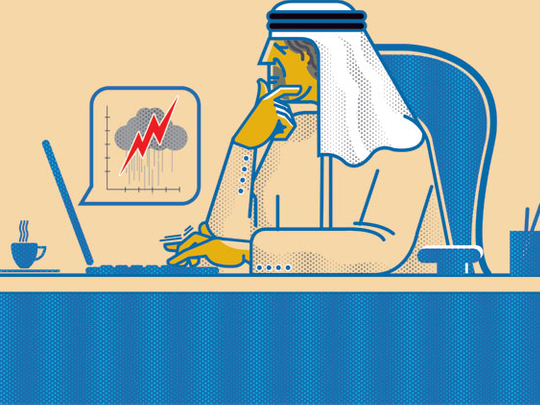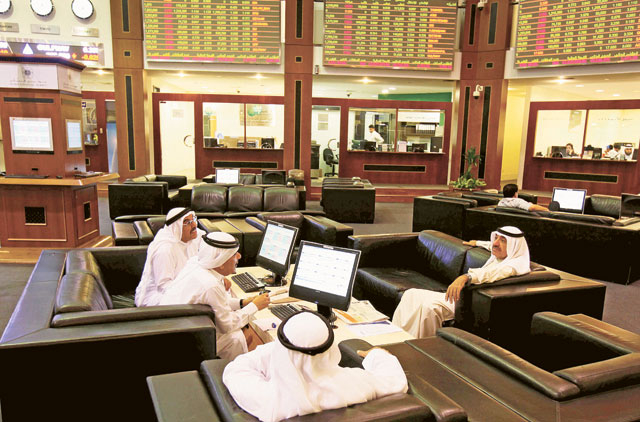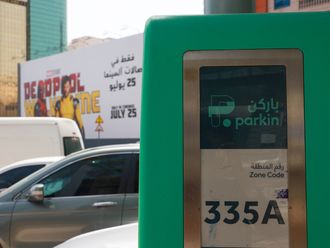
Lack of liquidity, poor market sentiment, frustrated and unhappy local retail investors and almost non-existent foreign investor interest.
It is little wonder that in an environment such as this the question of what can be done to reinvigorate the UAE markets and bring back increased investor interest is being asked across the country.
Since the start of the year, average daily traded value on both Dubai Financial Market and Abu Dhabi Securities Exchange have averaged $16 million (Dh58.7 million). Last year DFM's traded value fell to $32 million from 2010's $74 million. Abu Dhabi also fell from $37 million in 2010 to $27 million last year.
While their indices at the end of last year and at the start of the new year hit some of the new lows in years, in the past few days both made some gains. Year to date until last Thursday, the DFM was up 3.87 per cent and ADX was down a mere 0.50 per cent. However, the basic problems haven’t gone away.
But the general economic outlook in the UAE and, particularly Dubai, has not mirrored this trend. Apart from the emirate's debt burden and the oversupply in real estate, the economy is on a positive trend. Tourism and retail have picked up, registering strong growth when compared to 2010, while trade numbers are also growing. Oil prices held up well last year and show no signs of weakness this year. Yet all these positives haven't been reflected in the stock market.
Market observers blame major structural issues and lack of initiative from the government for the lacklustre state of the UAE market. To start with, they recommend consolidation of the three exchanges which, although discussed briefly last year, appears to have stalled. The total market capitalisation of the three UAE exchanges is currently less than $100 billion, which is less than that of either Saudi Arabia, Kuwait or Qatar.
"A merger between Abu Dhabi and Dubai exchanges would remove bureaucratic interrelation even with related parties such as UAE Central Bank and Emirates Securities and Exchange Authority," says Tariq Qaqish, deputy head of asset management Al Mal Capital, Dubai, adding that to trade on Dubai and Abu Dhabi, currently investors have to open two separate accounts.
Shakeel Sarwar, head of asset management at SICO Bahrain, agrees, pointing out that a merger would help streamline the investment process and more importantly give the market ‘some critical mass'.
"At this stage, it doesn't make sense for the UAE to have three exchanges," adds Rami Sidani, head of equities at Schroder's. "A consolidation is a must to increase the liquidity pool in the country."
It is also critical, fund managers say, that some of Dubai and Abu Dhabi's biggest companies step up, reviving markets that haven't seen a single IPO since 2007. Listings by corporations such as Emirates airline, Dewa and Dubai would not only create interest in the market and pave the way for fresh IPOs but will also improve the depth and composition of the stock markets, says Sarwar.
"You can first open to the local base and to foreigners later," says Haissam Arabi, chief executive, Gulfmena Investments. "This automatically brings in interest because people think they have an arbitrage coming at a discount to the market. Once you give the market a reason, liquidity is going to come. People want to invest, [but] they don't know where to invest."
The issue of corporate governance with increased focus on protection of minority interest has been a constant refrain from the investor community. Fund managers say that this is something that needs to be worked on to win back investor confidence.
‘Rights not protected'
"[People are] really sceptical about the protection they can enjoy when it comes to minority interests in the UAE market. Given how tiny the free float is and given the large sovereign ownership in some of these companies investors don't feel safe as they feel that as minority shareholders their rights are not protected," Sidani says.
"Because of large governmental ownership in some of these companies communication has been very, very weak because in a way they know that they can pass on any corporate decision they want as they have the reassurance of their major strategic investor, which is the government.
"So, you need to convince and push the government to increase the free floats. This will have major advantages whether in terms of improving liquidity or improving corporate governance and providing comfort to international investors."
Also, a speed up in issuing the long-awaited laws and regulations such as the Company Law and investment collective schemes is the need of the hour, say fund managers. This will motivate more companies to go public and increase market depth, in addition it will attract investors to a properly regulated market, says Qaqish.
The regulatory framework, under ESCA, needs further refinement, says Sarwar.
"Saudi Arabia's Capital Markets Authority (CMA) could be a good role model not only for the UAE, but also for other markets in the region," he says.
"The number of listed companies in the Saudi market have almost doubled since the arrival of CMA. Similarly tough and punitive actions have been taken against malpractices such as insider trading while the disclosure levels of the listed companies have vastly improved."
Qaqish would like to see proper process in relation to delisting public companies. Foreign investors, he says, were not pleased with the course taken with Tamweel, Amlak and even Aabar and its effect on minority shareholders.
Divided opinion
With regard to disclosure, he suggests imposing stricter penalties on companies that don't address disclosure of company information. "Shorten the period for public companies to disclose their quarterly and yearly results," he says. However, when it comes to government coming forward to bolster the subdued markets, opinion is divided. Sidani is against such a step.
"Unfortunately you always hear [during such times] calls for the government and sovereign wealth funds to pump in liquidity in the market, [but] it is not their role. It should not be required of them to just pump in liquidity in order to hike up prices, which is unsustainable in the long run.
"We have actually sovereign wealth funds in the UAE very disciplined to their mandate, which is primarily to diversify away from oil in the region and create future sources of income. Their role is not to interfere in the domestic market and move prices in a fake way. The market should move on fundamentals."
But other gulf markets such as Qatar, Saudi, Kuwait and Oman have been getting the support of their respective governments, sovereign wealth funds (SWFs) and institutional investors such as pension funds in the aftermath of the financial crisis. Saudi government sponsored pension funds and Qatari and Kuwaiti sovereign wealth funds have been active in the market during corrections. In 2009, the Omani government established a ‘stabilisation fund', with a similar aim.
"We feel that the UAE capital markets have not received sufficient support from government and semi-government institutional investors," says Sarwar. "The UAE SWFs are one of the largest investors in the world and it is estimated that they together manage over $1 trillion. Even a one per cent allocation to the domestic market means over $10 billion of dedicated long term institutional money.
"In addition, other UAE based institutional investors have been pulling funds out of the equity market. At the same time, the market is now dominated by unsophisticated retail investors and day traders, which has further aggravated the situation."
A dedicated $10 billion or $20 billion market maker fund that is going to be supported by all the government's investment authorities is a sure way to show confidence in the market, says Arabi.
"The idea is some sort of government push and make it public. There's nothing to hide," he adds.
"Also, it's not a bad idea to pour in money at a point when the prices are way too cheap."
Finally, the public companies have an onus too to counter negative sentiment. "From our perspective, the lack of interest in the UAE markets relates to a lack of interest in the shares listed on the various UAE exchanges," says Eric Swats, head of asset management and partner at Rasmala Investments. "As such, the operational performance of these companies needs to improve, or their share prices need to decline further, or new listings need to happen before investors will find renewed interest."
Qaqish highlights the importance of public companies to interact swiftly with market news. "We also encourage companies to dedicate resources to investor relations in order to address investors' inquiries and response to market issues," he adds
Saleem Khokhar, head of equities, asset management group, National Bank of Abu Dhabi concurs.
"UAE-listed companies will need to focus on attracting long term investors through increased investor relation presence and ease of access to senior management," he says.
"Ultimately the UAE is an attractive market but is currently suffering from a perception of increased risk due to concerns on debt refinancing caused by increased pressure on European Banks to deleverage their balance sheets."













